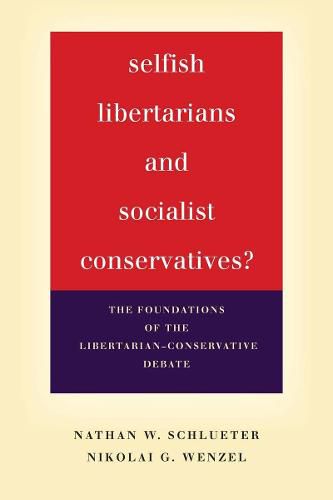Readings Newsletter
Become a Readings Member to make your shopping experience even easier.
Sign in or sign up for free!
You’re not far away from qualifying for FREE standard shipping within Australia
You’ve qualified for FREE standard shipping within Australia
The cart is loading…






In Selfish Libertarians and Socialist Conservatives?, Nathan W. Schlueter and Nikolai G. Wenzel present a lively debate over the essential questions that divide two competing political philosophies. Wenzel-a libertarian who believes the state should be restricted to protecting life, liberty, and property-and Schlueter-a conservative who thinks the state has a larger role to play in protecting public welfare, safety, and morals-explore the fundamental similarities and differences between their respective positions.
Over a series of point-counterpoint chapters, they lay out the essential tenets of their own stances, critiquing the other. This engaging dialogue introduces readers to the foundations of each political philosophy. To vividly illustrate the diverging principles underlying conservatism and libertarianism, the authors explore three different hot-button case studies: marriage, immigration, and education. Compact, accessible, and complete with suggestions for further reading, Selfish Libertarians and Socialist Conservatives? is an ideal teaching tool that places these two political perspectives in fruitful dialogue with one another.
$9.00 standard shipping within Australia
FREE standard shipping within Australia for orders over $100.00
Express & International shipping calculated at checkout
In Selfish Libertarians and Socialist Conservatives?, Nathan W. Schlueter and Nikolai G. Wenzel present a lively debate over the essential questions that divide two competing political philosophies. Wenzel-a libertarian who believes the state should be restricted to protecting life, liberty, and property-and Schlueter-a conservative who thinks the state has a larger role to play in protecting public welfare, safety, and morals-explore the fundamental similarities and differences between their respective positions.
Over a series of point-counterpoint chapters, they lay out the essential tenets of their own stances, critiquing the other. This engaging dialogue introduces readers to the foundations of each political philosophy. To vividly illustrate the diverging principles underlying conservatism and libertarianism, the authors explore three different hot-button case studies: marriage, immigration, and education. Compact, accessible, and complete with suggestions for further reading, Selfish Libertarians and Socialist Conservatives? is an ideal teaching tool that places these two political perspectives in fruitful dialogue with one another.